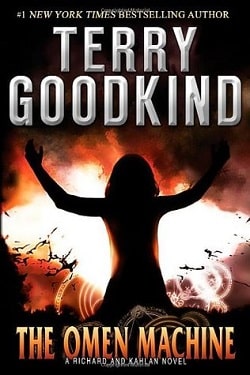Terry Goodkind's The Omen Machine, the twelfth installment in the acclaimed Sword of Truth series, continues to weave a rich tapestry of magic, morality, and the eternal struggle between good and evil. Set in a world where the boundaries of reality are constantly tested, this novel introduces readers to a complex narrative that is both engaging and thought-provoking.
The story begins with Hannis Arc, a character who embodies the essence of ambition and intellect. His work on the ancient Cerulean scrolls, which contain the language of Creation, serves as a metaphor for the quest for knowledge and power. The ethereal forms that visit him symbolize the unknown forces that often intervene in human affairs, a recurring theme in Goodkind's work. The imagery of these spectral shapes billowing into the room creates an atmosphere of suspense and intrigue, setting the stage for the conflicts that will unfold.
One of the most compelling aspects of The Omen Machine is its exploration of **free will versus destiny**. Goodkind delves into the philosophical implications of prophecy and the extent to which individuals can shape their own futures. The characters grapple with the weight of their choices, often facing dire consequences that challenge their moral compasses. This theme resonates deeply, prompting readers to reflect on their own lives and the forces that guide their decisions.
Character development is another strong suit of Goodkind's writing. The protagonists, Richard Rahl and Kahlan Amnell, continue to evolve as they confront new challenges. Richard, the Seeker of Truth, is portrayed as a figure of unwavering resolve, yet he is not without flaws. His struggles with leadership and the burden of responsibility add depth to his character, making him relatable and human. Kahlan, on the other hand, embodies strength and compassion, often serving as the moral anchor for Richard. Their relationship is tested throughout the narrative, showcasing the complexities of love in the face of adversity.
The introduction of new characters, such as the enigmatic Hannis Arc, adds layers to the story. Arc's motivations and ambitions create a compelling antagonist whose actions drive the plot forward. His interactions with Richard and Kahlan highlight the contrasting ideologies that underpin the conflict, enriching the narrative with philosophical debates about power, control, and the nature of evil.
Goodkind's prose is both lyrical and vivid, painting a picture of a world steeped in magic and danger. The descriptions of the settings, from the cluttered study of Hannis Arc to the vast landscapes of the New World, immerse readers in the story. The author’s ability to create a sense of place enhances the overall reading experience, allowing readers to visualize the intricate details of the world he has built.
Moreover, the pacing of the novel is well-executed, balancing moments of intense action with quieter, introspective scenes. Goodkind masterfully builds tension, leading to climactic confrontations that keep readers on the edge of their seats. The stakes are high, and the consequences of each character's choices reverberate throughout the narrative, creating a sense of urgency that propels the story forward.
However, some readers may find that The Omen Machine leans heavily on the philosophical discussions that have become a hallmark of Goodkind's writing. While these themes are thought-provoking, they can occasionally slow the pacing of the plot. Nevertheless, for those who appreciate a deeper exploration of moral dilemmas and the human condition, this aspect of the novel will be a rewarding experience.
In comparison to other fantasy authors, Goodkind's work stands out for its emphasis on **moral philosophy** and the psychological complexities of its characters. While authors like Brandon Sanderson and Patrick Rothfuss focus on intricate world-building and magic systems, Goodkind prioritizes the internal struggles of his characters and the ethical implications of their actions. This distinction makes The Omen Machine a unique entry in the fantasy genre, appealing to readers who seek more than just escapism in their literature.
Overall, The Omen Machine is a powerful continuation of the Sword of Truth series that challenges readers to confront their own beliefs about fate, free will, and the nature of good and evil. Goodkind's ability to blend action, philosophy, and character development creates a rich narrative that lingers long after the final page is turned. For fans of the series, this installment is a must-read, while newcomers will find it an intriguing entry point into a world filled with magic and moral complexity.
In conclusion, Terry Goodkind's The Omen Machine is not just a story about magic and adventure; it is a profound exploration of the human experience. With its compelling characters, intricate themes, and vivid prose, it invites readers to ponder the deeper questions of life while being entertained by a thrilling narrative. Whether you are a long-time fan of the series or a newcomer, this book is sure to leave a lasting impression.
























Reviews 0
Post a Reviews: